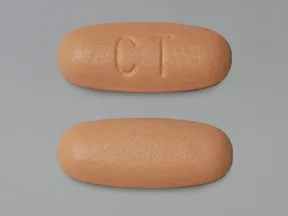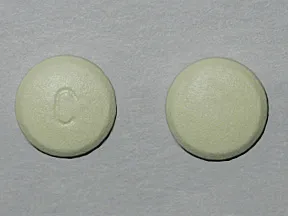Uses
Mycophenolate is used in combination with other medications to keep your body from attacking and rejecting your transplanted kidney. It belongs to a class of medications called immunosuppressants. It works by weakening your body's defense system (immune system) to help your body accept the new kidney as if it were your own.
How to use Myfortic
Read the Medication Guide provided by your pharmacist before you start taking mycophenolate and each time you get a refill. If you have any questions, ask your doctor or pharmacist.
Take this medication by mouth as directed by your doctor, usually twice daily on an empty stomach, 1 hour before or 2 hours after meals.
Swallow the tablet whole. Do not crush, chew, or break the tablet. Doing so may prevent your body from fully absorbing the drug.
Avoid handling or inhaling any dust from the tablets. Avoid direct contact with the skin or eyes. If contact occurs, wash the affected skin area well with soap and water or rinse your eyes with plain water. Consult your pharmacist for details.
Since this drug can be absorbed through the skin and lungs and may harm an unborn baby, women who are pregnant or who may become pregnant should not handle this medication or breathe the dust from the tablets.
The dosage is based on your medical condition and response to treatment. In children, it is also based on body size.
Use this medication regularly to get the most benefit from it. To help you remember, take it at the same times each day.
Keep taking this medication even if you feel well. Do not stop taking mycophenolate without first talking to your doctor.
Certain products may make it harder for your body to absorb mycophenolate if they are taken at the same time. Do not take this medication at the same time as antacids containing aluminum and/or magnesium, cholestyramine, colestipol, or calcium-free phosphate binders (such as aluminum products, lanthanum, sevelamer). Ask your pharmacist for more details.
Do not change brands or forms of mycophenolate unless directed by your doctor.
Side Effects
See also Warning section.
Constipation, nausea, headache, diarrhea, vomiting, stomach upset, gas, tremor, dizziness, drowsiness, or trouble sleeping may occur. If any of these effects last or get worse, tell your doctor or pharmacist promptly.
Remember that this medication has been prescribed because your doctor has judged that the benefit to you is greater than the risk of side effects. Many people using this medication do not have serious side effects.
Tell your doctor right away if you have any serious side effects, including: unusual tiredness, fast/irregular heartbeat, easy bleeding/bruising, swelling of the feet or ankles, joint pain/stiffness, muscle pain.
Get medical help right away if you have any very serious side effects, including: stomach/abdominal pain that doesn't go away, black stools, vomit that looks like coffee grounds, chest pain, shortness of breath/rapid breathing.
This medication may increase your risk of getting a rare but very serious (possibly fatal) brain infection (progressive multifocal leukoencephalopathy-PML). Get medical help right away if you have any of these side effects: clumsiness, loss of coordination/balance, weakness, sudden change in your thinking (such as confusion, difficulty concentrating, memory loss), difficulty talking/walking, seizure, vision changes.
A very serious allergic reaction to this drug is rare. However, get medical help right away if you notice any symptoms of a serious allergic reaction, including: rash, itching/swelling (especially of the face/tongue/throat), severe dizziness, trouble breathing.
This is not a complete list of possible side effects. If you notice other effects not listed above, contact your doctor or pharmacist.
In the US -
Call your doctor for medical advice about side effects. You may report side effects to FDA at 1-800-FDA-1088 or at www.fda.gov/medwatch.
In Canada - Call your doctor for medical advice about side effects. You may report side effects to Health Canada at 1-866-234-2345.
Warnings
Mycophenolate may lower your ability to fight infections. This may make you more likely to get a serious (rarely fatal) infection or make any infection you have worse. Tell your doctor right away if you have any signs of infection (such as sore throat that doesn't go away, fever, chills, cough, burning/painful/urgent urination, change in the amount of urine).
Mycophenolate may rarely cause cancer (such as lymphoma, skin cancer). Protect your skin from the sun. Avoid prolonged sun exposure, tanning booths, and sunlamps. Use a sunscreen and wear protective clothing when outdoors. Tell your doctor right away if you have any of the following symptoms of cancer: swollen glands, sudden weight loss, night sweats, change in appearance or size of moles, or unusual skin changes/growth.
Mycophenolate may harm an unborn baby. When using mycophenolate, men and women must use reliable forms of birth control. See also Precautions section.
Precautions
See also Warning section.
Before taking mycophenolate sodium, tell your doctor or pharmacist if you are allergic to it; or to mycophenolic acid; or to mycophenolate mofetil; or if you have any other allergies. This product may contain inactive ingredients, which can cause allergic reactions or other problems. Talk to your pharmacist for more details.
Before using this medication, tell your doctor or pharmacist your medical history, especially of: cancer, liver disease (such as hepatitis B, hepatitis C), current/past infections (such as herpes, shingles), stomach/intestinal problems (such as ulcers), rare genetic disorders (such as Lesch-Nyhan or Kelley-Seegmiller syndromes).
This drug may make you dizzy or drowsy. Alcohol or marijuana (cannabis) can make you more dizzy or drowsy. Do not drive, use machinery, or do anything that needs alertness until you can do it safely. Limit alcoholic beverages. Talk to your doctor if you are using marijuana (cannabis).
Mycophenolate can make you more likely to get infections or may make current infections worse. Stay away from anyone who has an infection that may easily spread (such as chickenpox, COVID-19, measles, flu). Talk to your doctor if you have been exposed to an infection or for more details.
Tell your health care professional that you are using mycophenolate sodium before having any immunizations/vaccinations. Avoid contact with people who have recently received live vaccines (such as flu vaccine inhaled through the nose).
To lower the chance of getting cut, bruised, or injured, use caution with sharp objects like razors and nail cutters, and avoid activities such as contact sports.
Before having surgery, tell your doctor or dentist about all the products you use (including prescription drugs, nonprescription drugs, and herbal products).
Do not donate blood while using mycophenolate and for 6 weeks after stopping this drug. Do not donate sperm while using mycophenolate and for 90 days after stopping this drug.
Since this drug can be absorbed through the skin and lungs and may harm an unborn baby, women who are pregnant or who may become pregnant should not handle this medication or breathe the dust from the tablets.
Tell your doctor if you are pregnant or plan to become pregnant. You should not become pregnant while using mycophenolate. Mycophenolate may harm an unborn baby. Your doctor should order a pregnancy test before you start this medication. Women using this medication should ask about reliable forms of birth control during treatment and for 6 weeks after the last dose. Men using this medication should ask about reliable forms of birth control during treatment and for 3 months after the last dose. If you or your partner becomes pregnant, talk to your doctor right away about the risks and benefits of this medication.
It is unknown if this drug passes into breast milk. Because of the possible risk to the infant, breastfeeding is not recommended while using this drug. Consult your doctor before breastfeeding.
Interactions
See also How to Use section.
Drug interactions may change how your medications work or increase your risk for serious side effects. This document does not contain all possible drug interactions. Keep a list of all the products you use (including prescription/nonprescription drugs and herbal products) and share it with your doctor and pharmacist. Do not start, stop, or change the dosage of any medicines without your doctor's approval.
Some products that may interact with this drug include: other drugs that weaken the immune system/increase the risk of infection (such as natalizumab, rituximab).
This medication may decrease the effectiveness of hormonal birth control such as pills, patch, or ring. This could cause pregnancy. Discuss with your doctor or pharmacist about using a reliable backup birth control method while using this medication. Also tell your doctor if you have any new spotting or breakthrough bleeding, because these may be signs that your birth control is not working well.
Overdose
If someone has overdosed and has serious symptoms such as passing out or trouble breathing, call 911. Otherwise, call a poison control center right away. US residents can call 1-800-222-1222. Canada residents can call 1-844-764-7669.
Do not share this medication with others.
Lab and/or medical tests (such as blood counts, drug levels, kidney function, pregnancy test) should be done while you are taking this medication. Keep all medical and lab appointments. Consult your doctor for more details.
Attend a transplant education class or support group to learn more about the signs and symptoms of kidney rejection. Tell your doctor right away if you have any of the following symptoms: decreased amount of urine, fever, tenderness at the transplant site, or weight gain of more than 2 pounds in a day with possible swelling of the ankles.
If you miss a dose, take it as soon as you remember. If it is near the time of the next dose, skip the missed dose. Take your next dose at the regular time. Do not double the dose to catch up.
Store at room temperature away from light and moisture. Do not store in the bathroom. Keep all medications away from children and pets.
Do not flush medications down the toilet or pour them into a drain unless instructed to do so. Properly discard this product when it is expired or no longer needed. Consult your pharmacist or local waste disposal company.
Images

Myfortic 360 mg tablet,delayed release
Color: orange-redShape: ovalImprint: CTThis medicine is a orange-red, oval, film-coated, tablet imprinted with "CT".

Myfortic 180 mg tablet,delayed release
Color: lime greenShape: roundImprint: CThis medicine is a orange-red, oval, film-coated, tablet imprinted with "CT".
You Might Also Like
Are you currently using Myfortic?
This survey is being conducted by the WebMD marketing sciences department.
Selected from data included with permission and copyrighted by First Databank, Inc. This copyrighted material has been downloaded from a licensed data provider and is not for distribution, except as may be authorized by the applicable terms of use.
CONDITIONS OF USE: The information in this database is intended to supplement, not substitute for, the expertise and judgment of healthcare professionals. The information is not intended to cover all possible uses, directions, precautions, drug interactions or adverse effects, nor should it be construed to indicate that use of a particular drug is safe, appropriate or effective for you or anyone else. A healthcare professional should be consulted before taking any drug, changing any diet or commencing or discontinuing any course of treatment.